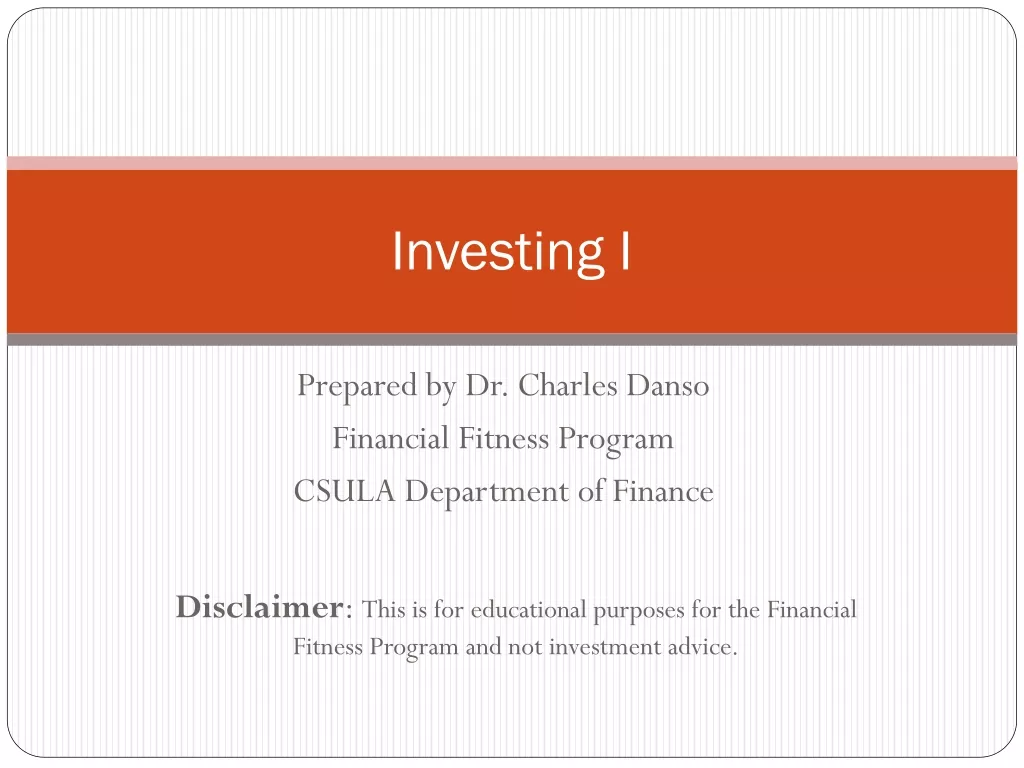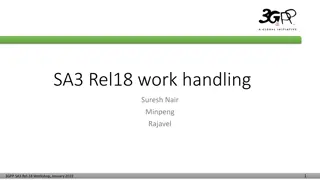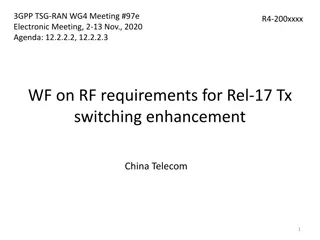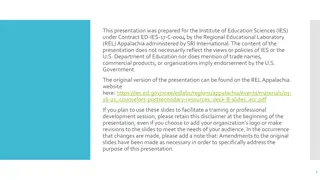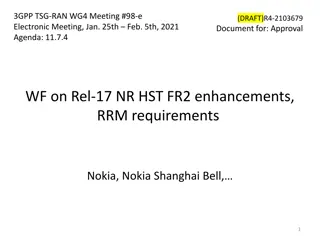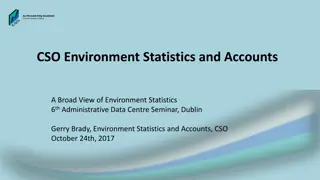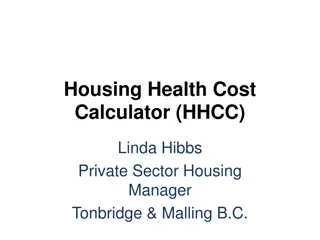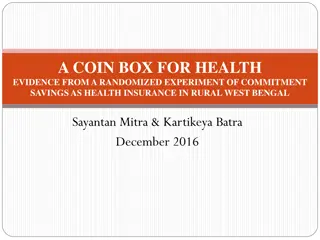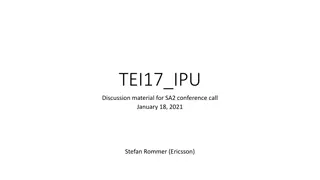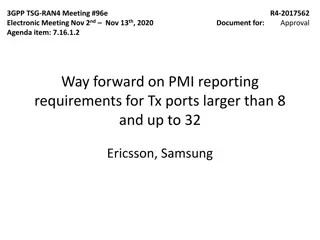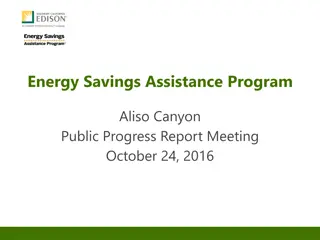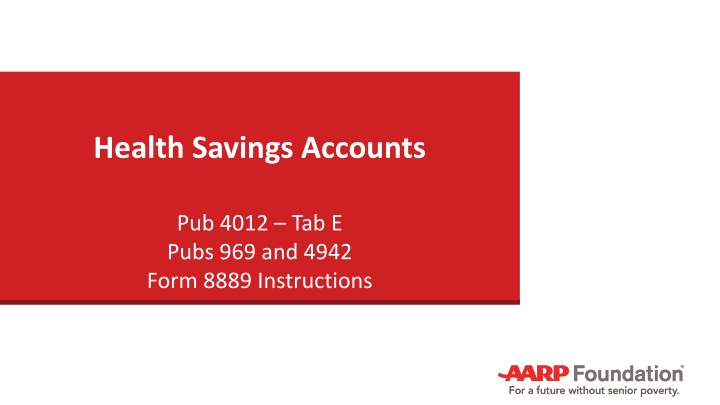
Health Savings Accounts (HSA) - Benefits, Eligibility, and Setup
Discover the benefits of Health Savings Accounts (HSA) including tax deductions, nontaxable distributions, and portability. Learn about eligibility requirements, permissible health coverage, and how to set up an HSA. Get insights on HSA trusts and the importance of IRS certification for VITA/TCE counselors.
Uploaded on | 3 Views
Download Presentation

Please find below an Image/Link to download the presentation.
The content on the website is provided AS IS for your information and personal use only. It may not be sold, licensed, or shared on other websites without obtaining consent from the author. If you encounter any issues during the download, it is possible that the publisher has removed the file from their server.
You are allowed to download the files provided on this website for personal or commercial use, subject to the condition that they are used lawfully. All files are the property of their respective owners.
The content on the website is provided AS IS for your information and personal use only. It may not be sold, licensed, or shared on other websites without obtaining consent from the author.
E N D
Presentation Transcript
Health Savings Accounts Pub 4012 Tab E Pubs 969 and 4942 Form 8889 Instructions
IRS Certification Pub 4942 2018 Course and Test VITA/TCE Counselors must pass Health Savings Account (HSA) test to certify States may not conform Check state for scope 2 NTTC Training TY 2018
HSA Benefits Contributions are potential tax deduction Employer contribution excluded from taxable W-2 wages Contributions accumulate tax free until distributed 3 NTTC Training TY 2018
HSA Benefits Distributions nontaxable with paid unreimbursed qualified medical expenses HSA remains with the taxpayer Portable with job change or retirement Contributions remain in account until used 4 NTTC Training TY 2018
HSA Defined HSA is tax-exempt trust or custodial account set up with qualified HSA trustee Must be eligible individual Limited tax deductible contributions 5 NTTC Training TY 2018
HSA Eligibility Requirements Must be covered under high deductible health plan (HDHP) for self or family Insurer identifies qualified plans Cannot be covered by other health insurance Exceptions next slide Spouse eligible for other coverage if not HSA owner Eligible individual cannot be a dependent of another taxpayer 6 NTTC Training TY 2018
Permissible Health Coverage with HSA Pub 4942 or 969 Insurances allowed with HSA Disability Dental Vision Accident Long-term care Limited flexible spending account 7 NTTC Training TY 2018
HSA Set up HSA can be set up by Eligible individual Eligible individual through employer plan 8 NTTC Training TY 2018
HSA Trust Pub 969 HSA trust must be with authorized HSA trustee No provision for jointly owned HSA When HSA holder dies and Beneficiary is surviving spouse Treated as spouse s Beneficiary other than surviving spouse Accounts stops being HSA out of scope 9 NTTC Training TY 2018
Contributions to HSA Contributions can be made by Eligible individual Employer Any other individual Treated as gift Deductible by the taxpayer Contributions must be cash No stock or property 10 NTTC Training TY 2018
Employer HSA Contributions Employer can set up HSA for employee with authorized trustee HSA must be set up before end of year Taxpayer must have HDHP coverage during the year Contribution not taxable wages to employee 11 NTTC Training TY 2018
Individual HSA Contribution Qualified HSA contributions by individuals are deductible No income or compensation requirement As for IRA 12 NTTC Training TY 2018
HSA Contribution Limit Contribution limits depend on Type of HDHP coverage Self or family Date taxpayer became eligible individual Date taxpayer ceased being eligible individual Taxpayer s age 13 NTTC Training TY 2018
HSA Contribution Limit 2018 HSA contribution limit $3,450 for self-only HDHP $6,900 for family HDHP Additional $1,000 if age 55 or older Reduced by employer contributions 14 NTTC Training TY 2018
Example 1: HSA Deduction Carla is an eligible individual Had self-only HDHP coverage for entire year Had HSA for entire year Age 38 She can contribute and deduct up to $3,450 15 NTTC Training TY 2018
Example 2: HSA Deduction Same as Example 1, add that: Carla s employer contributes $900 to Carla s HSA Reported on W-2 Box 12 code W She can contribute and deduct up to $2,550 ($3,450 maximum contribution - $900 W-2 contribution) 16 NTTC Training TY 2018
Partial Year HSA Eligibility Form 8889 Instructions Monthly eligibility determined on first day of each month A taxpayer who is not HSA eligible the entire year Contribution limited to greater of Limitation chart and worksheet Maximum contribution based on first day of last month of tax year (last-month rule) 17 NTTC Training TY 2018
HSA Contribution Last-Month Rule Eligible individual can make full year contribution if Eligible individual on first day of last month of tax year Generally December 1 And remain eligible individual during 12 month testing period From December 1 of the current year through December 31 of the following year 18 NTTC Training TY 2018
Example 3: HSA Deduction Maria, age 48: Eligible individual with self-only HDHP coverage from January through August Not an eligible individual from September through December Use the limitation chart and worksheet in Form 8889 Instructions to calculate her maximum contribution 19 NTTC Training TY 2018
Example 3: HSA Deduction, cont. January 3,450 February 3,450 Maria will enter $3,450 for March 3,450 April 3,450 Jan Aug; $0 for Sept Dec May 3,450 June 3,450 July 3,450 Deduction limited to greater August 3,450 0 September of $0 (Dec deduction) or $2,300 October 0 November 0 December 0 ($27,600 [8 X $3450] 12) Total for all months 27,600 Limitation. Divide the total by 12 2,300 20 NTTC Training TY 2018
Example 4: Last-Month Rule On December 1, 2018: Chris, age 53, is eligible individual for HSA Started family HDHP coverage Expects to meet the testing period requirement by remaining eligible through December 31 of the following tax year Under the last-month rule, he can contribute up to $6,900, the maximum family contribution limit for 2018 21 NTTC Training TY 2018
Example 5: Testing Period Testing period not met: Assume Chris from Example 4 is not an eligible individual starting June 2019 He must recalculate his 2018 allowable contribution and include the excess contribution in his 2019 income (subject to additional 10% tax) He s entitled to 1/12 of $6,900 or $575 (Dec 2018) $6,325 taxable income in 2019 ($6,900 - $575) Note that Chris 2019 return is out of scope 22 NTTC Training TY 2018
HSA Rules for Married Taxpayers When both spouses are HSA eligible and Each has self-only HDHPcoverage Each can contribute $3,450 Total contribution/deduction = $6,900 (self only limit $3,450 X 2) Additional contribution 55 or older can contribute additional $1,000 23 NTTC Training TY 2018
HSA Rules for Married Taxpayers Either spouse has family HDHP coverage, both spouses treated as having family HDHP coverage Family contribution limit applies $6,900 Split evenly unless agree upon different split Max contribution and deduction = $6,900 Additional contribution 55 or older can contribute additional $1,000 24 NTTC Training TY 2018
Example 6: Married Taxpayer Pub 4012 Tab E Mr. and Mrs. Auburn are eligible individuals Mr. Auburn is 58 years old, Mrs. Auburn is 53 Both have HDHP family coverage and an HSA They may split the family ($6,900) contribution limit equally or may agree on a different division Mr. Auburn can contribute an additional $1,000 to his HSA because he is age 55 or over 25 NTTC Training TY 2018
Excess HSA Contribution Do not claim deduction for excess contribution Withdraw excess contribution by due date of return Withdraw and include on return Earnings on the excess e.g. Interest Earnings reported as other income form 1040 26 NTTC Training TY 2018
Excess HSA Contributions Form 5329 Part VII Excess contributions incur additional 6% tax until Withdrawn or Used as qualified contribution in later year Out of scope if additional tax applies 27 NTTC Training TY 2018
HSA Contribution Deadline HSA contributions can be made up to due date of return Without regard to extensions 28 NTTC Training TY 2018
HSA Distributions Distributions not taxed if used to pay or reimburse qualified medical expenses Expense must beincurred after HSA set up Even if the last-month rule is used No time limit to take distribution Do not deduct medical expense on Schedule A if expenses will be reimbursed by HSA If reimburse medical that was previously deducted, treat as a recovery (tax benefit rule applies to see if it is taxable) 29 NTTC Training TY 2018
Excess HSA Distribution Excess distribution included as taxable income Form 8889 entry Other income Form 1040 Subject to 20% addition to tax Exceptions Death Disability After age 65 30 NTTC Training TY 2018
Nonqualified HSA Distributions Form 1099-SA Instructions Taxpayer can repay nonqualified distribution no later than April 15 following first year account beneficiary knew/should have known distribution in error 31 NTTC Training TY 2018
Qualified Medical Expenses Pub 502 Medical and Dental Expenses Qualified medical expenses include Medical and dental expenses that would qualify as itemized deduction Doctors, dentists, and hospitals Medicine or drug if Requires prescription Prescription for over-the-counter medicine Insulin 32 NTTC Training TY 2018
Qualified Medical Insurance Expense Pub 969 Insurance premiums that are qualified medical expenses Long-term care coverage COBRA Coverage while receiving unemployment Medicare or other coverage if over 65 Not supplemental coverage, e.g. medigap 33 NTTC Training TY 2018
Qualifying Expense for Family members Qualifying expenses incurred by Taxpayer and spouse Dependents claimed on return Others who could have been claimed as a dependent except that Person filed a joint return or Person failed gross income test or Taxpayer or spouse could be claimed as a dependent on another s return 34 NTTC Training TY 2018
HSA Rollovers or Transfers Pub 969 HSA rollover and transfer rules similar to IRA Trustee-to-trustee transfers nontaxable and not considered rollover Only one rollover allowed during 12-month period Must be completed within 60 days Rollover and transfers not subject to contribution limits 35 NTTC Training TY 2018
HSA Recordkeeping HSA recordkeeping is taxpayer s responsibility Maintain receipts to support qualified distributions 36 NTTC Training TY 2018
Form 1099-SA Distributions 37 NTTC Training TY 2018
Form 5498-SA Contributions 38 NTTC Training TY 2018
Form 8889 Form 8889 Instructions If taxpayer and spouse both have HSA File separate Form 8889 for each If one has family coverage Use Family for both Split allowable contribution between taxpayer and spouse Line 6 Form 8889 39 NTTC Training TY 2018
TaxSlayer Form 8889 Input Indicate owner Indicate type of plan 40 NTTC Training TY 2018
TaxSlayer Form 8889 Input NTTC-Modified Pub 4012 Tab E Form 8889 Health Savings Account If one spouse has Self-only or Family family coverage, When the box is checked, manually complete the HSA Adjustment Section both considered to have family coverage Check box when both spouses have HSAs and one spouse has family coverage 41 NTTC Training TY 2018
TaxSlayer Form 8889 HSA Adjustment NTTC-Modified Pub 4012 Tab E If box is checked, Check here if you and your spouse have separate HSAs : enter HSA contribution limitation $6,900 for 2018 if full year eligible or last-month rule applies or worksheet amount Form 8889 Line 3 Enter HSA contribution or agreed upon allocation Form 8889 Line 6 42 NTTC Training TY 2018
TaxSlayer Form 8889 Distributions NTTC-Modified Pub 4012 Tab E 43 NTTC Training TY 2018
HSA Out of Scope Excess contributions to HSA not withdrawn in timely fashion Qualified HSA funding distributions from an IRA Death of an HSA holder when surviving spouse is not the beneficiary 44 NTTC Training TY 2018
HSA Out of Scope Archer Medical Saving Accounts (MSA) Medicare Advantage MSA Health Reimbursement Arrangement Form 8889, Part III 45 NTTC Training TY 2018
HSA Quality Review Confirm taxpayer has HDHP Confirm contributions made or will be made by due date of return Confirm distributions offset by qualified medical expenses and expenses not deducted on Schedule A Verify Form 8889 and Form 1040 results 46 NTTC Training TY 2018
Health Savings Accounts 47 NTTC Training - TY2018


